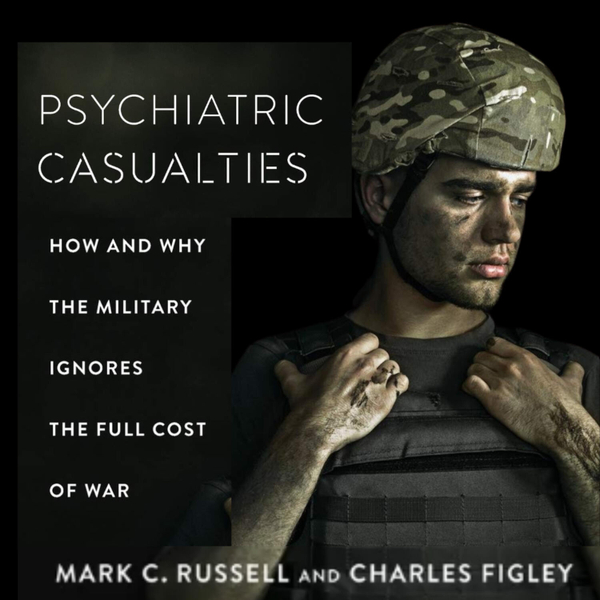
Coping with Mental Anguish and Untreated Psychological Injuries
- S1E6
- 1:03:18
- May 3rd 2024
Mark Russell and Charles Figley unpack the complexities of psychiatric casualties, exploring the full scope of mental health crises and the systemic failures in addressing them. From cultural idioms of distress to the mislabeling of combat veterans, they shine a light on the urgent need for a holistic approach to military mental health care.
They navigate the intricate web of neuropsychiatric diagnoses, the stigmatization of mental health issues, and the dire consequences of untreated psychological injuries. This episode serves as a stark reminder of the real and devastating impact of chronic stress on our service members, and the pressing need for change in military mental health policies.
Listen in as Mark and Charles share their personal encounters with compassion fatigue, revealing the raw and human side of those tasked with the care of our nation's heroes. Their candid conversation is a call to action, urging us to acknowledge and address the invisible wounds of war with the same urgency and respect as physical injuries.
Table of Contents for Discussion
For further insights and to join the conversation, reach out to Mark at [email protected]. Your engagement can help pave the way for a future where military mental health is no longer a silent battlefield.
Tune into our CHW Streaming Radio and the full lineup at cominghomewell.com
Download on Apple Play and Google Play
Online-Therapy.com ~ Life Changing Therapy Click here for a 20% discount on your first month.
Thank you for listening! Be sure to SHARE, LIKE and leave us a REVIEW!
Psychiatric Casualties
This podcast is a clinical exploration into the untold truth of military mental healthcare from two insiders. Join Navy Veteran and psychologist, Mark Russell and Marine Veteran and psychologist, Charles Figley as they explore evidence of preventable generational wartime mental health crises, the "dark side" of the military's long-standing strategies to deal with its mental health dilemma, and what is required to truly transform behavioral health both within and outside of military populations.
***Some of the subject matter can be intense and potentially triggering.***
Have questions or comments? Email Dr. Mark Russell at [email protected]
Dr. Figley is the Tulane University Paul Henry Kurzweg Chair in Disaster Mental Health. Professor Figley is recognized as one of the foremost experts on trauma and is the recipient of numerous lectureships and other honors in the US and throughout the world. He has published more than 200 refereed journal articles, 29 books, more than 540 presentations, and more than 110 book chapters in his long career. His work draws collectively on more than 37 research projects focusing on traumatic stress, and resilience of individuals, families, and communities. Dr. Figley co-authored Psychiatric Casualties: How and Why the Military Ignores the Full Cost of War with Dr. Mark Russell.
Professor Figley credits his nearly four years in the USMC with maturity building and early insights about human stress and coping and influenced his career as an academic focusing on traumatic stress and the impact on service providers. This, in turn, led to his life-long effort to study the human side of being and caring for others, including war veterans and their families. Today, given his 5 decades as a professor, an author, presenter, and humanitarian, he is considered the “father of trauma” by the American Psychological Association.
Mark is a retired Navy Commander and clinical psychologist with over 26-years of military service including 10-years as an enlisted Marine. He is dual-Board certified by the American Board of Professional Psychology (ABPP) in clinical psychology and clinical child and adolescent psychology. Co- author of Treating Traumatic Stress Injuries in Military Personnel: An EMDR Practitioner’s Guide (Routledge, 2013) and Psychiatric Casualties: How and why the military ignores the full cost of war (Columbia University Press, June 2021) with Charles Figley, and co-authored Eye Movement Desensitization and Reprocessing (EMDR therapy): In 2005, Commander Russell became a military whistleblower after filing a Department of Defense Inspector’s General complaint against the head of military medicine for “harmful gross negligence” resulting in a preventable military mental health crisis. His efforts were featured in USA Today (2007); the 2015 documentary film, Thank You for Your Service! and the 2022 documentary Strangers at Home. He was awarded the Distinguished Psychologist Award by the Washington State Psychological Association and the Meritorious Service Medal by the President of the United States for his sustained effort to transform military mental healthcare, as well as the recipient of the 2018 Outstanding Service in the Field of Trauma Psychology by the American Psychological Association Division 56 Trauma Psychology.